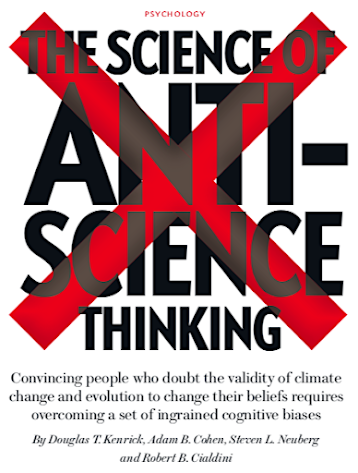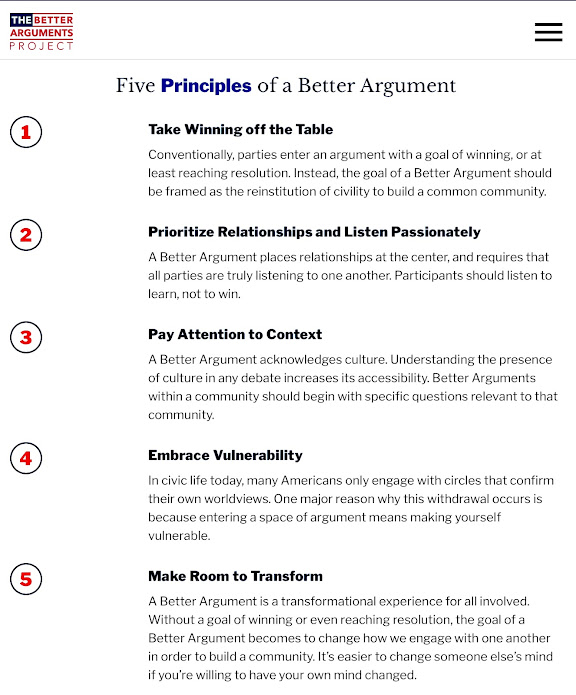Just more applied psychology, really.
"There is a large literature on persuasion and social influence that could be quite useful to anyone attempting to communicate with a group holding beliefs that fly in the face of scientific evidence. For their part, scientists need to adopt a more systematic approach in collecting their own data on the effectiveness of different strategies for confronting antiscientific thinking about particular issues. It is essential to understand whether an individual’s resistance to solid evidence is based on simple heuristic thinking, systematic bias or particular social motives..."
From Scientific American, July 2018
In principle, science should set itself apart from the hue and cry of partisan bickering. After all, the scientific enterprise reaches its conclusions by testing hypotheses about the workings of the natural world. Consider the porpoise. Based on its appearance and aquatic home, the animal was assumed to be a fish. But evidence gleaned from observing its bone structure, its lack of gills and the genes it holds in common with other warm-blooded land animals leads to its being classified as a mammal with a very high level of confidence.
Yet a consensus about what constitutes a fact does not always come so readily. Take a glance at your online news feed. On a regular basis, government decision makers enact policies that fail to heed decades of evidence on climate change. In public opinion surveys, a majority of Americans choose not to accept more than a century of evidence on evolution by natural selection. Academic intellectuals put the word “science” in quotes, and members of the lay public reject vaccinations for their children.
Scientific findings have long met with ambivalent responses: A welcome mat rolls out instantly for horseless buggies or the latest smartphones. But hostility arises just as quickly when scientists’ findings challenge the political or religious status quo…
In principle, scientific thinking should lead to decisions based on consideration of all available information on a given question. When scientists encounter arguments not firmly grounded in logic and empirical evidence, they often presume that purveyors of those alternative views either are ignorant of the facts or are attempting to discourage their distribution for self-serving reasons—tobacco company executives suppressing findings linking tobacco use to lung cancer, for instance. Faced with irrational or tendentious opponents, scientists often grow increasingly strident. They respond by stating the facts more loudly and clearly in the hope that their interlocutors will make more educated decisions.
Several lines of research, however, reveal that simply presenting a litany of facts does not always lead to more objective decision making. Indeed, in some cases, this approach might actually backfire. Human beings are intelligent creatures, capable of masterful intellectual accomplishments. Unfortunately, we are not completely rational decision makers.
Understanding why people engage in irrational thinking requires combining knowledge from a range of psychological disciplines…
Explaining why thinking goes astray is critically important to dispel false beliefs that circulate among politicians, students or even misinformed neighbors. Our own research and that of our colleagues have identified key obstacles that stand in the way of clear scientific thought. We have investigated why they arise and how they might be challenged and ultimately knocked down. Among the many hurdles, three in particular stand out:
Shortcuts. Human brains are endowed with a facile means for dealing with information overload. When we are overwhelmed or are too short on time, we rely on simple heuristics, such as accepting the group consensus or trusting an expert.
Confirmation Bias. Even with ample time and sufficient interest to move beyond shortcuts, we sometimes process information in a manner less like an impartial judge and more like a lawyer working for the mob. We show a natural tendency to pay attention to some findings over others and to reinterpret mixed evidence to fit with preexisting beliefs.
Social Goals. Even if we surmount the first two obstacles, powerful forms of social motivation can interfere with an objective analysis of the facts at hand. Whether one is biased toward reaching one scientific conclusion versus another can be influenced by the desire to win status, to conform to the views of a social network or even to attract a mate…
Yeah. This stuff goes to the topics of a couple of my most recent post.
We might also look at the model and methods of this organization.
Click to enlarge.
A virtue I am seeing with this group that they are more focused on the doing rather than the theory. I just attended my first Zoom webinar with them. I am impressed.
ANOTHER COOL BLOG FIND
The "Public understanding of science" blog.
Populists around the globe accuse political elites of ignoring the will of ‘the common people’. Oftentimes, however, they also bash academic elites – scientists, experts, and other epistemic authorities – for producing knowledge that is allegedly out of touch and useless, does not suit practical needs, and may contradict what ‘ordinary folks’ think. Such views have been echoed by politicians, businessmen, and celebrities…Yeah.
Stay tuned.
"SCIENCE" ERRATA
Is there a "Science of Success?" A "Science of Deliberation?" A "Science of the Biofield?" A "Science of Self-Awareness?" "Science and Democracy?" "Define 'Science'." "Why Trust Science?"
WHY SHOULD WE CARE?
Recall my candidate list of exigencies.
UPDATE:
STRESS-TESTING MY FEALTY TO THE PRINCIPLE OF CHARITY
From my latest Amazon book email recommendations.
“The science of genetics is now showing how most liberals have almost everything exactly backwards. For example, progressives insist that income and wealth inequality have recently been increasing in America but this is untrue. By every measure inequality in the US has been only converging since the end of WWI and the same holds true for the developing world during the last 50 years. Those on the left (and almost every sociologist) are in the firm grip of false beliefs regarding class, gender and race. Because they are at root "levelers" they mistakenly contend that all ethnic groups (ancestral local breeding groups) are on average equivalent in every complex human behavioral trait. This is incorrect as are almost all of their other assertions. Read this book and learn the facts which most authors are hesitant to discus for fear of being errantly labeled "classist", "sexist" and/or "racist". Lastly, the great thing about science is that it is true where you believe it or not.”
apropos of this prior post.
UPDATE
The author is a retired attorney from PA. He apparently has quite the menu of dislikes. And no background in any of the sciences that I can unearth.
Beyond the glaring Straw Man fallacies, I'm just not seeing the relevance here. His 98 page "book" is a rambling stream of disparate political pet peeves, sprinkled with dashes of #Sciencyness here and there.
_________








No comments:
Post a Comment